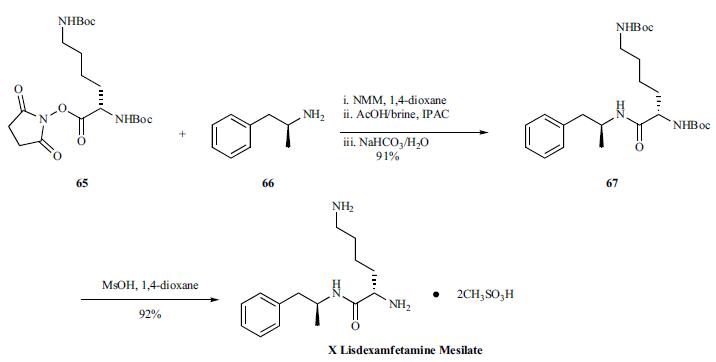(2S)-2,6-DIAMINO-N-[(1S)-1-METHYL-2-PHENYLETHYL]HEXANAMIDE DIMETHANESULFONATE
Synonym(s):Lisdexamfetamine dimesylate solution
- CAS NO.:608137-33-3
- Empirical Formula: C16H29N3O4S
- Molecular Weight: 359.49
- MDL number: MFCD16628114
- EINECS: 200-659-6
- SAFETY DATA SHEET (SDS)
- Update Date: 2024-08-04 20:11:12
![(2S)-2,6-DIAMINO-N-[(1S)-1-METHYL-2-PHENYLETHYL]HEXANAMIDE DIMETHANESULFONATE Structural](https://img.chemicalbook.in/CAS/GIF/608137-33-3.gif)
What is (2S)-2,6-DIAMINO-N-[(1S)-1-METHYL-2-PHENYLETHYL]HEXANAMIDE DIMETHANESULFONATE?
Description
ADHD is a neurobehavioral disorder characterized by varying degrees of
inattention, hyperactivity, and impulsivity. ADHD is typically diagnosed in
childhood and affects 7–12% of the pediatric population in the United States with
the condition often enduring into adulthood.
While the precise mechanism of action of lisdexamfetamine
in treating ADHD is not known, amphetamines are believed to inhibit the
reuptake of the neurotransmitters dopamine and noradrenaline (norepinephrine),
thereby increasing their presynaptic availability and release into extraneuronal space. The prodrug is constructed by the condensation of D-amphetamine with the activated ester (N-hydroxysuccinimide) of bis-tert-butoxycarbonylprotected L-lysine. Lisdexamfetamine is ultimately generated by treatment with hydrochloric acid in dioxane.
The most common adverse events, comparable to other amphetamine formulations, were decreased appetite, insomnia, upper abdominal pain, and irritability. Lisdexamfetamine is contraindicated in patients with advanced arteriosclerosis, symptomatic cardiovascular disease, moderate-to-severe hypertension, hyperthyroidism, known hypersensitivity to the sympathomimetic amines, glaucoma, a predisposition to agitated states, and a history of drug abuse. In addition, the drug should not be administered during or within 14 days of treatment with monoamine oxidase inhibitors. It has also been noted that psychostimulants may exacerbate symptoms of pre-existing psychotic disorders, so caution and close observation are recommended in this patient population.
Description
Lisdexamfetamine (mesylate) (Item No. 18050) is an analytical reference material categorized as an amphetamine. Its chemical structure consists of D-amphetamine (Item Nos. 14204 | 15650) coupled with the essential amino acid L-lysine. Lisdexamfetamine is an inactive prodrug that is converted to D-amphetamine upon cleavage of the lysine via enzymatic hydrolysis in red blood cells. Lisdexamfetamine is regulated as a Schedule II compound in the United States. This product is intended for research and forensic applications.
Originator
New River Pharmaceuticals (US)
The Uses of (2S)-2,6-DIAMINO-N-[(1S)-1-METHYL-2-PHENYLETHYL]HEXANAMIDE DIMETHANESULFONATE
Treatment of atten tion deficit hyperactivity disorder (ADHD).
brand name
Vyvanse
Synthesis
The straightforward synthesis of lisdexamfetamine mesilate was initiated by adding a solution of D-amphetamine (66) to a solution of Boc-L-Lys(Boc)-OSu (65), N-methylmorpholine and 1,4-dioxane. The resulting mixture was partitioned between isopropyl acetate and an acetic acid/brine solution, and the organic layer was washed with aqueous sodium bicarbonate to give Boc-L-Lys(Boc)- D-amphetamine (67) in 91% yield. The two primary amine groups were liberated by reacting a solution of 67 in 1,4- dioxane with methanesulfonic acid providing lisdexamfetamine mesilate (X) in 92% yield.

Properties of (2S)-2,6-DIAMINO-N-[(1S)-1-METHYL-2-PHENYLETHYL]HEXANAMIDE DIMETHANESULFONATE
| Flash point: | 9℃ |
| storage temp. | -20°C |
| form | A neat solid |
Safety information for (2S)-2,6-DIAMINO-N-[(1S)-1-METHYL-2-PHENYLETHYL]HEXANAMIDE DIMETHANESULFONATE
| Signal word | Danger |
| Pictogram(s) |
 Flame Flammables GHS02  Skull and Crossbones Acute Toxicity GHS06  Health Hazard GHS08 |
| GHS Hazard Statements |
H225:Flammable liquids H370:Specific target organ toxicity, single exposure |
| Precautionary Statement Codes |
P210:Keep away from heat/sparks/open flames/hot surfaces. — No smoking. P260:Do not breathe dust/fume/gas/mist/vapours/spray. P280:Wear protective gloves/protective clothing/eye protection/face protection. P311:Call a POISON CENTER or doctor/physician. P301+P310:IF SWALLOWED: Immediately call a POISON CENTER or doctor/physician. |
Computed Descriptors for (2S)-2,6-DIAMINO-N-[(1S)-1-METHYL-2-PHENYLETHYL]HEXANAMIDE DIMETHANESULFONATE
(2S)-2,6-DIAMINO-N-[(1S)-1-METHYL-2-PHENYLETHYL]HEXANAMIDE DIMETHANESULFONATE manufacturer
Ind Swift Laboratories Ltd
New Products
Tert-butyl bis(2-chloroethyl)carbamate 4-Methylphenylacetic acid N-Boc-D-alaninol N-BOC-D/L-ALANINOL N-octanoyl benzotriazole 3-Morpholino-1-(4-nitrophenyl)-5,6-dihydropyridin- 2(1H)-one Furan-2,5-Dicarboxylic Acid DIETHYL AMINOMALONATE HYDROCHLORIDE 1,1’-CARBONYLDIIMIDAZOLE R-2-BENZYLOXY PROPIONIC ACID 1,1’-CARBONYLDI (1,2-4 TRIAZOLE) N-METHYL INDAZOLE-3-CARBOXYLIC ACID (2-Hydroxyphenyl)acetonitrile 4-Bromopyrazole 5-BROMO-2CYANO PYRIDINE 5,6-Dimethoxyindanone 5-broMo-2-chloro-N-cyclopentylpyriMidin-4-aMine 2-(Cyanocyclohexyl)acetic acid 4-methoxy-3,5-dinitropyridine 1-(4-(aminomethyl)benzyl)urea hydrochloride 2-aminopropyl benzoate hydrochloride diethyl 2-(2-((tertbutoxycarbonyl)amino) ethyl)malonate tert-butyl 4- (ureidomethyl)benzylcarbamate Ethyl-2-chloro((4-methoxyphenyl)hydrazono)acetateYou may like
-
 608137-33-3 Lisdexamfetamine dimesylate 99%View Details
608137-33-3 Lisdexamfetamine dimesylate 99%View Details
608137-33-3 -
 608137-33-3 99%View Details
608137-33-3 99%View Details
608137-33-3 -
 Lisdexamfetamine dimesylate solution CAS 608137-33-3View Details
Lisdexamfetamine dimesylate solution CAS 608137-33-3View Details
608137-33-3 -
 1975-50-4 98%View Details
1975-50-4 98%View Details
1975-50-4 -
 2-HYDROXY BENZYL ALCOHOL 98%View Details
2-HYDROXY BENZYL ALCOHOL 98%View Details
90-01-7 -
 14714-50-2 (2-Hydroxyphenyl)acetonitrile 98+View Details
14714-50-2 (2-Hydroxyphenyl)acetonitrile 98+View Details
14714-50-2 -
 118753-70-1 98+View Details
118753-70-1 98+View Details
118753-70-1 -
 733039-20-8 5-broMo-2-chloro-N-cyclopentylpyriMidin-4-aMine 98+View Details
733039-20-8 5-broMo-2-chloro-N-cyclopentylpyriMidin-4-aMine 98+View Details
733039-20-8